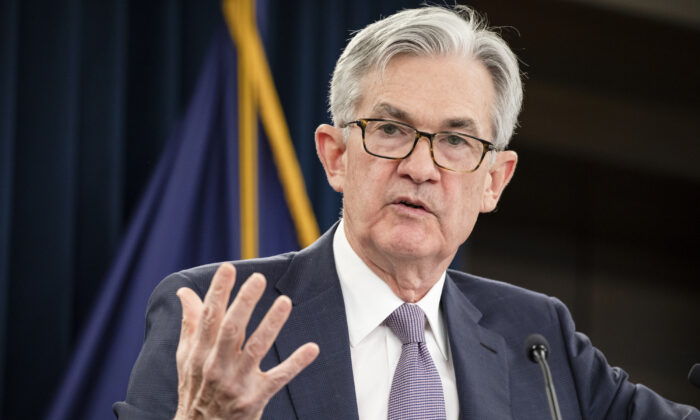Federal Reserve Chair Jerome Powell on Wednesday warned of the threat of a prolonged recession due the pandemic and urged lawmakers and the Trump administration to ramp up spending to prevent long-lasting economic damage.
Speaking at a virtual question and answer session, Powell said the United States faces an economic hit “without modern precedent.”
“The scope and speed of this downturn are without modern precedent, significantly worse than any recession since World War II,” Powell said in prepared remarks before holding an online discussion with the Peterson Institute for International Economics.

Powell appealed for more fiscal stimulus, which is within the purview of Congress and the White House.
“Additional fiscal support could be costly, but worth it if it helps avoid long-term economic damage and leaves us with a stronger recovery. This tradeoff is one for our elected representatives, who wield powers of taxation and spending,” said Powell.
The outbreak of the CCP (Chinese Communist Party) virus, the novel coronavirus that causes the COVID-19 disease, has battered economies worldwide.
In the United States, the virus-related lockdowns and plummeting demand have destroyed a record 20.5 million jobs in April, according to Labor Department figures released May 8, and pushed the unemployment rate to 14.7 percent, both post-World War II records.
“Among people who were working in February, almost 40 percent of those in households making less than $40,000 a year had lost a job in March,” Powell said. “This reversal of economic fortune has caused a level of pain that is hard to capture in words, as lives are upended amid great uncertainty about the future.”
“Demand collapsed. The coronavirus worldwide caused the collapse in demand. Through no fault of anybody, this virus has pushed us into a big economic contraction,” White House economic advisor Larry Kudlow told CNBC in a recent interview.
 White House economic adviser Larry Kudlow talks to media outside the White House in Washington on Sept. 26, 2019. (Charlotte Cuthbertson/The Epoch Times)
White House economic adviser Larry Kudlow talks to media outside the White House in Washington on Sept. 26, 2019. (Charlotte Cuthbertson/The Epoch Times)But while Kudlow said last week that talks on further virus-related spending bills were on pause until the impact of the ones adopted so far could be gauged, Powell called for more federal stimulus to prevent a wave of bankruptcies and prolonged joblessness, adding that preventing economic damage was more of a priority than worries about debt.
“I think now, when we are facing the biggest shock the economy has had in modern times, is for me not the time to prioritize considerations of debt,” Powell said.
Besides Kudlow, other Trump administration officials have said they want to first see how previous aid packages affect the economy.
“What the president and I are now saying is: we’ve spent a lot of money, a lot of this money is not even into the economy yet. Let’s take the next few weeks,” Treasury Secretary Steven Mnuchin said in an interview with “Fox News Sunday.”
“I’m having conversations with both the democrats and republicans to understand these issues. The president and I are having conversations with outside people, with business. We just want to make sure that before we jump back in and spend another few trillion of taxpayers’ money, that we do it carefully,” Mnuchin said.
 Secretary of the Treasury Steve Mnuchin (R) speaks to media while Secretary of State Mike Pompeo looks on, in the White House briefing room in Washington on Jan. 10, 2020. (Charlotte Cuthbertson/The Epoch Times)
Secretary of the Treasury Steve Mnuchin (R) speaks to media while Secretary of State Mike Pompeo looks on, in the White House briefing room in Washington on Jan. 10, 2020. (Charlotte Cuthbertson/The Epoch Times)Republican leaders in Congress have also expressed skepticism about allowing significant more spending right now, with Senate Majority Leader Mitch McConnell (R-Ky.), recently saying there is no “urgency” to act.
House Speaker Rep. Nancy Pelosi (D-Calif.), meanwhile, unveiled a more than $3 trillion COVID-19 aid package, which includes around $1 trillion for states and cities, “hazard pay” for essential workers, and a new round of cash payments to individuals.
“There are those who said, ‘Let’s just pause,’” she said. “Hunger doesn’t take a pause. Rent doesn’t take a pause. Bills don’t take a pause.”
 Speaker of the House Rep. Nancy Pelosi (D-Calif.) holds a press conference about the $2.2 trillion stimulus bill in the Capitol in Washington on March 26, 2020. (Charlotte Cuthbertson/The Epoch Times)
Speaker of the House Rep. Nancy Pelosi (D-Calif.) holds a press conference about the $2.2 trillion stimulus bill in the Capitol in Washington on March 26, 2020. (Charlotte Cuthbertson/The Epoch Times)Powell said the cost of stimulus measures would be “worth it if it helps avoid long-term economic damage and leaves us with a stronger recovery.”
“Deeper and longer recessions can leave behind lasting damage to the productive capacity of the economy,” Powell warned, adding, “Avoidable household and business insolvencies can weigh on growth for years to come.”
He said the Fed would “continue to use [its] tools to their fullest” until the viral outbreak subsides, noting that the central bank had already reduced its benchmark interest rate to near zero.
While giving no hint of what the Fed’s next steps might be, he rejected calls for negative interest rates, a move that requires banks to pay interest on money they keep on deposit at the Fed, thus encouraging them to instead lend it out and so stimulate the economy.
“I know there are fans of the policy,” Powell said. But “this is not something that we’re looking at.”
Powell said the economy could eventually return to where it was before the pandemic, with unemployment at a 50-year low of 3.5 percent.
“It’ll take some time to get back to where we were,” he said. “I have every reason to think we should get back there.”
The Associated Press contributed to this report.
Focus News: Fed’s Powell Warns of Long-Term Harm to Economy, Says Congress Must Act
